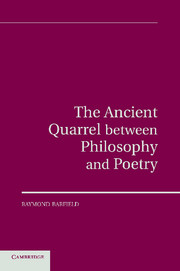Book contents
- Frontmatter
- Contents
- Acknowledgments
- Introduction
- 1 Socrates, Plato, and the Invention of the Ancient Quarrel
- 2 Aristotle, Poetry, and Ethics
- 3 Plotinus, Augustine, and Strange Sweetness
- 4 Boethius, Dionysius, and the Forms
- 5 Thomas and Some Thomists
- 6 Vico's New Science
- 7 Kant and His Students on the Genius of Nature
- 8 Hegel and the Owl of Minerva
- 9 Kierkegaard: A Poet, Alas
- 10 Dilthey: Poetry and the Escape from Metaphysics
- 11 Nietzsche, Heidegger, and the Saving Power of Poetry
- 12 Mikhail Bakhtin and Novelistic Consciousness
- Index
- References
6 - Vico's New Science
Published online by Cambridge University Press: 03 May 2011
- Frontmatter
- Contents
- Acknowledgments
- Introduction
- 1 Socrates, Plato, and the Invention of the Ancient Quarrel
- 2 Aristotle, Poetry, and Ethics
- 3 Plotinus, Augustine, and Strange Sweetness
- 4 Boethius, Dionysius, and the Forms
- 5 Thomas and Some Thomists
- 6 Vico's New Science
- 7 Kant and His Students on the Genius of Nature
- 8 Hegel and the Owl of Minerva
- 9 Kierkegaard: A Poet, Alas
- 10 Dilthey: Poetry and the Escape from Metaphysics
- 11 Nietzsche, Heidegger, and the Saving Power of Poetry
- 12 Mikhail Bakhtin and Novelistic Consciousness
- Index
- References
Summary
In his New Science, Giambattista Vico offers a very different perspective on the quarrel between poetry and philosophy, in which he reconsiders who the poets are, what their role has been, and what philosophy is to do with them. He offers a view that exiles neither poetry nor philosophy from the domain of wisdom, and he resists artificial boundaries set up between disciplines. Vico was born in the same city as Aquinas, Naples, in 1668. He attained a professorship of rhetoric in 1699 at the University of Naples and held this position until his retirement. In his first inaugural oration ushering in the academic year, he insisted that all branches of knowledge, the entire “universe of learning,” should be the aim of the human mind, an aim that cultivates a kind of diversity in the mind. The key to all accumulated knowledge is that we rightly know ourselves: the truth of the whole and knowledge of the self are always related for Vico. In the range and type of idea that he is willing to entertain, he has a kind of daring that rests in a notion of providence that allows us not to worry too much about “getting it right,” for providence is robust enough to avoid being foiled by our own limitations: “Intensely ambitious as we are to attain truth, let us engage upon its quest. If we fail in the quest, our very longing will lead us as by the hand toward the Supreme Being, who alone is the Truth and the Path and Guide to it.”
- Type
- Chapter
- Information
- The Ancient Quarrel Between Philosophy and Poetry , pp. 125 - 147Publisher: Cambridge University PressPrint publication year: 2011

